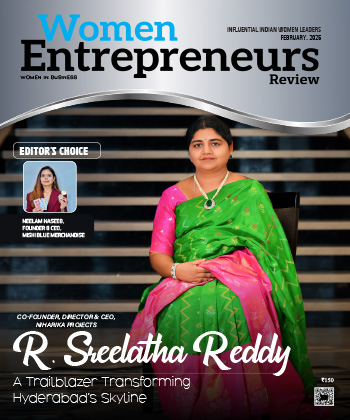
Middle East Moving Towards Equity Powered by GCC's Vision 2030
By: Rachita Sharma, Managing Editor | Tuesday, 16 September 2025
Women’s empowerment and growth has been undergoing an evolution in the Middle East.
Traditionally a male dominated society, for decades women in the Middle East lacked the opportunities regarding accessing education and financial independence. However, with time, this has evolved. In 1970s Saudi Arabia’s King Saud University became the region’s first higher educational institute to open its doors for women. From then women’s education has risen manifold, with women now making up nearly 50 percent of university students in the GCC.
With the rise of education, women’s presence in business and entrepreneur has also been on a rise, albeit a gradual progression. A 2022 report by Heidrick & Struggles found that the Middle East lags behind in gender diversity when it comes to women in leadership as compared to the global average.
However, affirmative action has been undertaken by the region’s governments and companies to improve gender balance in the workforce and boost women’s representation in leadership roles. The GCC has also undertaken an audacious goal under the GCC’s vision 2030 targets which aims to promote women's leadership by implementing legal and policy reforms, increasing women's participation in the workforce, investing in their education and skills, and fostering supportive company cultures.
A key role in motivating women is by presenting inspirational role-models across all mediums. To this end, the current edition of WER magazine highlights women CEOs from the Middle East. These women are not just boss-ladies steering their businesses to success but are also paving the road ahead for future female leaders.
One such leader featured in the current edition of WER magazine is Rema Omar. She stands at the forefront of communication services industry as the CEO of Universal Group. Her commitment and determination are propelled by innovation and service excellence, determined to influence strategic execution and client-focused delivery. One of her major milestones is when in 2007, she took on the role of Manging Director of QSAT, where she successfully led the company through seven years of sustained growth.
Rema is joined by Fay, a seasoned 3D design and production specialist with architectural training from the UK and professional roots in Hong Kong. Her strategic vision drives BIDllc’s core philosophy and has contributed to numerous large-scale global projects. Fay consistently delivers cutting-edge, high-quality 3D solutions, with a continued commitment to precision, quality, and innovation that shapes both her company’s future and the industry’s evolution.
These women are harbingers of change in Middle East’s business world.
Most Viewed
- 1 Women's Health Startup HerMD Closing Doors Amid Industry Challenges
- 2 5 Famous Women in Indian Armed Forces
- 3 Saudi Women No longer Require Male Permission for Clothing Choices, says Prince MbS
- 4 Kolkata Medtech Startup Innovodigm Raises Rs 5.5 Crore Seed Funding Led by IAN Group
- 5 Yamunanagar's Kashish Kalra Honoured after Securing 111th Rank in UPSC Civil Services Exam
- 6 Madurai Appoints Its First Woman Corporation Head
- 7 IAS Vijayalakshmi Bidari Appointed as the new Nagpur Divisional Commissioner
- 8 American Entrepreneur Lucy Guo Overtakes T Swift to become Youngest Female Billionaire
- 9 ICC Women's World Cup 2025 Trophy Showcased at Indore's Holkar Stadium
- 10 Aparna Saxena's Beauty Venture AntiNorm Launches in India
- 11 Vidya Nataraj Co-Founded BlueStone Jewellery & Lifestyle files IPO
- 12 5 Women Freedom Fighters of India
- 13 Dr. G Krishnapriya appointed as CEO for Trichy
- 14 M3M & Sirona Partner to Introduce Menstrual Hygiene Vending Machines in 15 Locations
- 15 Punjab Govt launches SHE Cohort 3.0 Supporting Tech-led Women Startups
- 16 Indian origin Lawyer, Sweena Pannu appointed as the US New Superior Court Judge
- 17 The Aurora Tech Award recognizes 4 Indian Women-led Startups
- 18 Kerala's Republic Day parade featured an all-female tableau
- 19 Manisha Kabbur Becomes Karnataka's First Woman International Karate Coach
- 20 Director K. S. Ravikumar's Daughter Maalica Ravikumar Launches Life Coaching Company 'Evergrowth Academy' for Women
- 21 Leezu's Raises Pre-Seed Funding to Accelerate Growth in Sexual Wellness Industry
- 22 Sattu: Super-easy summer drink for PCOS gut healing
- 23 Swathi Nelabhatla creates Sitha App, India's First Women-Exclusive Gig Platform
- 24 7 Timeless Female Kathak Dancers & their Iconic Legacies
- 25 Meet 7 Iconic Women Architects of Modern India & their Most Impactful Work
- 26 This Woman-led Insuretech Startup is Helping Bridge the Education Financing Gap in India
- 27 Women Leaders Share Lessons Learnt from India Women's WC Win
- 28 5 Enterprising Women Founders Powering Singapore's Tech & Innovation Landscape
- 29 4 Women. 4 Stories. One Vision for Smarter, Stronger Healthcare
- 30 Global Gender Gap Narrows to 68.8%, But Full Equality 123 Years Away: WEF Report 2025
- 31 Changemakers: 7 Women Entrepreneurs Taking the Make in India Movement Forward
- 32 Meet Lucy Guo, The Youngest Self-Made Female Billionaire Disrupting Tech
- 33 How Women are Driving India's Festive Online Shopping Surge






